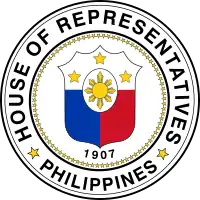Cornelio Villareal
Cornelio T. Villareal (September 11, 1904 – December 22, 1992) was a Filipino politician who served as Speaker of the House of Representatives of the Philippines from 1962 to 1967, and again from 1971 to 1972. Popularly known as Kune, his congressional career representing the Second District of Capiz spanned six decades.
Cornelio T. Villareal | |
|---|---|
 | |
| 11th Speaker of the House of Representatives of the Philippines | |
| In office April 1, 1971 – September 23, 1972 | |
| Preceded by | Jose Laurel Jr. |
| Succeeded by | Querube Makalintal (as speaker of the Interim Batasang Pambansa) |
| In office March 9, 1962 – February 2, 1967 | |
| Preceded by | Daniel Z. Romualdez |
| Succeeded by | Jose Laurel Jr. |
| House Minority Leader | |
| In office January 27, 1958 – March 9, 1962 | |
| Preceded by | Eugenio Pérez |
| Succeeded by | Daniel Z. Romualdez |
| Member of the House of Representatives from Capiz's 2nd district | |
| In office June 30, 1987 – June 30, 1992 | |
| Preceded by | District re-established[1] |
| Succeeded by | Vicente Andaya Jr. |
| In office December 30, 1941 – September 23, 1972 | |
| Preceded by | José Dorado |
| Succeeded by | District abolished |
| 9th Governor of Capiz | |
| In office 1942–1945 | |
| Preceded by | Gabriel Hernandez |
| Succeeded by | Ludovico Hidrosollo |
| Personal details | |
| Born | September 11, 1904 Mambusao, Capiz, Philippine Islands |
| Died | December 22, 1992 (aged 88) Metro Manila, Philippines |
| Nationality | Filipino |
| Political party | Liberal (1946-1992) |
| Other political affiliations | Nacionalista (1934-1946) |
| Spouse | Angeles Lema |
| Alma mater | Silliman University Philippine Law School (LL.B) |
| Occupation | Politician |
| Profession | Lawyer |
Early life
Villareal was born in Mambusao, Capiz. He finished his intermediate and secondary education in Capiz, and enrolled at the Silliman University for his pre-law course.[2] In 1929, he received his law degree from the Philippine Law School and passed the bar exams on December 07, 1929.
Political career
Villareal's political career began in 1934, when he was elected as a delegate to the 1935 Constitutional Convention. In 1941, Villareal won his first election as a Member of the House of Representatives, representing the Second District of Capiz. His term was interrupted by the Japanese invasion in late 1941, but he reassumed his seat in 1945[3] He was re-elected in 1946 under the banner of the Liberal Party, and served continuously until 1972. In 1951, Villareal unsuccessfully sought election to the Philippine Senate, for the seat vacated by Fernando Lopez upon the latter's election as Vice-President.
Villareal was first elected Speaker of the House of Representatives during the 5th Congress, in March 1962. During the 6th Congress, he was unseated as speaker in 1967 by Jose Laurel, Jr. of the Nacionalista Party. Villareal regained the Speakership from Laurel, Jr. during the 7th Congress in 1971, and served in that capacity until Congress was abolished upon the declaration of martial law by President then dictator Ferdinand Marcos Sr. in September 1972.[3]
Villareal withdrew from politics until Congress was restored following the ouster of Marcos. At age 83, he was again elected to his congressional seat in the Second District of Capiz in 1987. He was the oldest member of the 8th Congress, while his colleague from Capiz, Gerardo "Dinggoy" Roxas, Jr., was the youngest member of Congress. Ironically, Roxas would outlive Villareal only by a few months.
Villareal did not seek re-election following the expiration of his term in June 1992.
Death
He died six months later, aged 88.[4]
During his congressional career, Villareal advocated liberal economic and trade policies such as decontrol and decentralization.[5]
References
- Corazon L. Paras; La Vina, Dean Karlo B. (1996). The Speakers of the Philippine Legislative Branch. House of Representatives of the Philippines. ISBN 971-92100-0-1.
Notes
- Last helf by Himself
- Tiempo, Edilberto K.; Maslog, Crispin C.; Sitoy, T. Valentino, Jr. (1977). Silliman University 1901-1976. Silliman University. p. 96.
{{cite book}}: CS1 maint: multiple names: authors list (link) - Paras & La Vina, p. 116
- Paras & La Vina, pp. 116-117
- Paras & La Vina, p. 116-117
- Congress abolished in 1972, substituted by the Batasang Pambansa from 1978 to 1986
